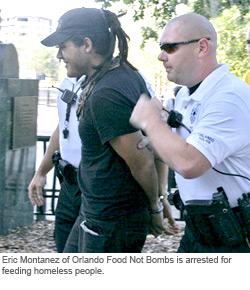Jun 10, 2008
 Unconscionable: adjective
Unconscionable: adjective
1. not guided by conscience; unscrupulous.
2. not in accordance with what is just or reasonable: unconscionable behavior.
3. excessive; extortionate: an unconscionable profit.
I have had some "unconscionable" things on my mind a lot lately as I have been working with the 20-somethings who make up Orlando Food Not Bombs and University of [...]
Read the Full Article

Already a subscriber? Login